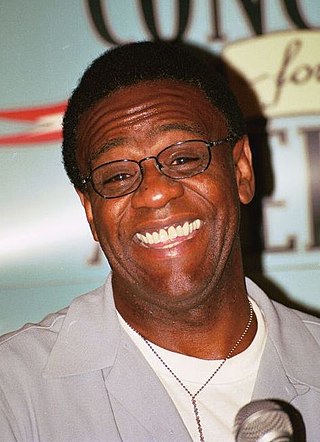
Albert Leornes Greene, known professionally as Al Green, is an American singer, songwriter, pastor and record producer best known for recording a series of soul hit singles in the early 1970s, including "Take Me to the River", "Tired of Being Alone", "I'm Still in Love with You", "Love and Happiness", and his signature song, "Let's Stay Together". After his girlfriend died by suicide, Green became an ordained pastor and turned to gospel music. He later returned to secular music.

I Never Loved a Man the Way I Love You is the tenth studio album by American singer Aretha Franklin, released on March 10, 1967 by Atlantic Records. It was Franklin's first release under her contract with the label, following her departure from Columbia Records after nine unsuccessful jazz standard albums, and marked a commercial breakthrough for her, becoming her first top 10 album in the United States, reaching number 2 on the Billboard 200. Two singles were released to promote the album: "Respect" and "I Never Loved a Man ". The former topped the Billboard Hot 100, while latter reached the top 10.
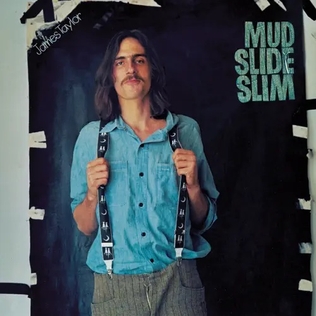
Mud Slide Slim and the Blue Horizon is the third studio album by American singer-songwriter James Taylor, released in April 1971 by Warner Bros. Records. The album was recorded between early January and late February of the same year.
The Memphis Horns was an American horn section, made famous by their many appearances on Stax Records. The duo consisted of Wayne Jackson on trumpet and Andrew Love on tenor saxophone. An "offshoot of the Mar-Keys", they continued to work together for over 30 years. They lent their sound to 83 gold and platinum awards and over one hundred high-charting records, including Otis Redding's "(Sittin' On) The Dock of the Bay", Al Green's "Let's Stay Together", and Elvis Presley's "Suspicious Minds".

The Genius of Ray Charles is a 1959 Ray Charles album, released in October by Atlantic Records, the seventh album since the debut Ray Charles in 1957. The album consists of swinging pop with big band arrangements. It comprises a first half of big band songs and a second half of string-backed ballads. The Genius of Ray Charles sold fewer than 500,000 copies and charted at number 17 on the Billboard 200. "Let the Good Times Roll" and "Don't Let the Sun Catch You Cryin'" were released as singles in 1959.

Al Green Explores Your Mind is the eighth album by soul singer Al Green. Unlike previous Al Green albums, this album featured only one major hit, the U.S. #7 hit "Sha-La-La ", but did contain the original version of "Take Me to the River", a song which went to #26 on the Billboard chart when covered by Talking Heads in 1978. In 2004, the song "Take Me to the River" was ranked number 117 on Rolling Stone magazine's list of the 500 greatest songs of all time.

Al Green Is Love is the ninth album by soul singer Al Green. It was his final of six consecutive albums to hit number 1 on the R&B/Soul Albums chart, and it peaked into the Top 40 on the Pop Albums chart.

Al Green's Greatest Hits is a 1975 greatest hits release by soul singer Al Green. In 2003, the album was ranked number 52 on Rolling Stone magazine's list of the 500 greatest albums of all time, maintaining the rating in a 2012 revised list. The album's ranking dropped to number 456 in the 2020 revised list. The compilation has consistently ranked as one of the best executed 'greatest hits' albums in history. The album peaked at No. 3 on the Billboard Top Soul LPs chart and No. 17 on the Top LPs chart.
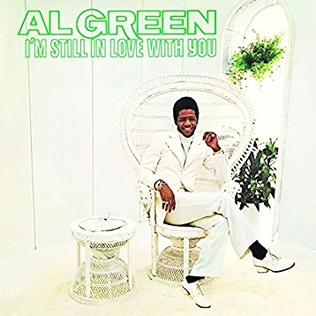
I'm Still in Love with You is the fifth studio album by the American gospel and soul singer Al Green, released on October 23, 1972, on Hi Records. Recording sessions took place during 1972. The album was produced solely by Willie Mitchell. The album peaked at number four on the US Billboard 200 and number one on the US Top R&B/Hip-Hop Albums and produced four singles: "Love and Happiness" which was rated ninety-eight on Rolling Stones's 500 Greatest Songs of All Time as well as "I'm Still in Love with You" and "Look What You Done for Me" which were top five hits on the US Pop Chart. In 2003, the album was ranked number 285 on the 500 greatest albums of all time by Rolling Stone, 286 in a 2012 revised list, and number 306 in a 2020 revised list. The introductory drum break to the album's second track, "I'm Glad You're Mine", was sampled by The Notorious B.I.G. in his later-posthumous single "Dead Wrong".

Livin' for You is the seventh album from soul musician Al Green. Released in 1973 it includes the hit title track and "Let's Get Married." The album cracked the Top 25 in the Billboard Pop Albums chart and was the fourth album from the artist to peak at #1 on the Soul Albums chart.

Full of Fire is the 10th studio album by soul singer Al Green, released in 1976.

Have a Good Time is the 11th studio album by soul singer Al Green, released in 1976.

Tokyo Live is a live album by American soul singer Al Green released in 1981 from two June 1978 shows in Tokyo. Band: Recorded live at Nakano Sun Plaza Hall, Tokyo, Japan on June 23 & 24, 1978. Personnel: Al Green (vocals); James Bass, Bernard Staton (guitar); Buddy Jarrett ; Ron Echols ; Daryl Neeley, Fred Jordan (trumpet); Johnny Brown (keyboards); Reuben Fairfax Jr. (bass); John Toney (drums); Ardis Hardin (percussion); Linda Jones, Margaret Foxworth.

He Is the Light is an album by Al Green, released in 1985. It was Green's first album for A&M Records.
"Take Me to the River" is a 1974 song written by singer Al Green and guitarist Mabon "Teenie" Hodges. Hit versions were recorded by Syl Johnson, Talking Heads and Delbert McClinton. In 2004, Al Green's original version was ranked number 117 on Rolling Stone magazine's list of the Rolling Stone's 500 Greatest Songs of All Time.
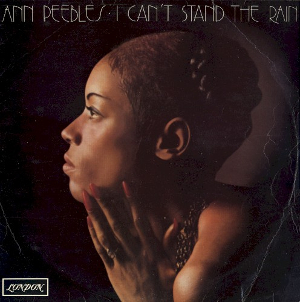
I Can't Stand the Rain is the fourth studio album by American Memphis soul singer Ann Peebles. It was released on the Hi label in 1974 and was her highest-charting record on the Billboard 200, where it reached no. 155 and spent 7 weeks. Produced by Willie Mitchell and largely written by Peebles and her husband, Don Bryant, I Can't Stand the Rain included the R&B hits "I'm Gonna Tear Your Playhouse Down" and "I Can't Stand the Rain", the latter of which reached no. 6 on the R&B chart and no. 38 on the Billboard Hot 100 in 1973.

Call Me is the sixth album by soul singer Al Green. It is widely regarded as Green's masterpiece, and has been called one of the best soul albums ever made. In 2003 the TV network VH1 named it the 70th greatest album in any genre. Call Me was a Top 10 Billboard Pop Album, and the third #1 Soul Album. In 2003, the album was ranked number 289 on Rolling Stone magazine's list of the 500 greatest albums of all time, and 290 in a 2012 revised list. Praised for his emotive singing style, Green here incorporates country influences, covering both Willie Nelson and Hank Williams. This album contained three top 10 singles on the Billboard Hot 100: "You Ought to Be with Me," "Here I Am " and "Call Me ."
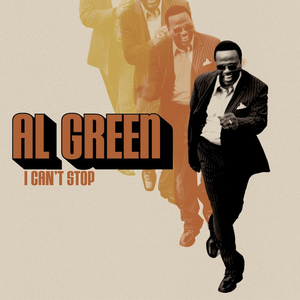
I Can't Stop is the 27th studio album by American soul singer Al Green. It was released by Blue Note Records on November 17, 2003, in the United Kingdom and on November 18 in the United States. Produced by Willie Mitchell, the album was Green's first since 1995, his first for Blue Note, and his first collaboration with Mitchell since 1985's He Is the Light; it was also Green's first entirely secular recording since the 1970s.

"Look What You Done for Me" is a 1972 song by Al Green, the first single released from his album I'm Still in Love with You. The song reached #4 on the Billboard Hot 100 and #2 on the Hot Soul Singles chart. It was certified as a gold record by the Recording Industry Association of America.

Straight from the Heart is the third studio album by American Memphis soul singer Ann Peebles. It was released on the Hi label in 1974 and included the songs "I Pity the Fool" and "Breaking Up Somebody's Home".



















